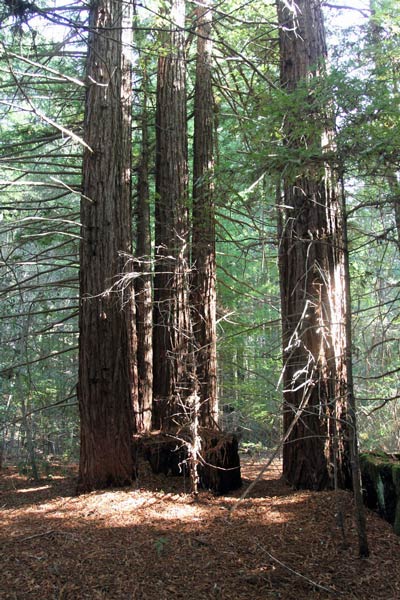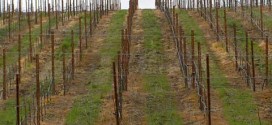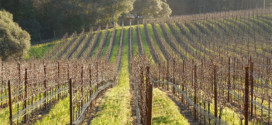Issues summary:
Artesa Annapolis
forest conversion to vineyards
Permanent coastal forest clear-cuts – irreversible loss of forest and soils. Unlike logging clear-cuts, vineyard conversions remove viable tree stumps and topsoils that regenerate forests, and replace them with a barren foundation of substrate for intensive agriculture. Artesa will permanently eliminate 154 acres of coastal redwood forests for vineyards, reservoirs, roads, and development.

Redwood forest on the Artesa property in Annapolis, CA
Precedent for speculative vineyard sprawl in California coastal forestlands. The permissive Artesa EIR and Timber Conversion Permit is the first approved major vineyard conversion of forestland in California, and set the precedent for permits to be emulated by other domestic and multinational corporations seeking to expand vineyards into California coastal forestland. Over 70% of Sonoma County’s forestland lies outside protected “timber production zone” (TPZ) zoning that prohibits forest conversion, and is vulnerable to sprawl of vineyards like Artesa.
Water demand of intensive agriculture in a water-scarce area. Artesa claims that it will irrigate vineyards only with the rainfall it captures to fill its reservoir, but has not adequately explained how it will maintain vineyards during droughts, when rainfall may not fill the reservoir. Incredibly, it claims that it would not use the unregulated wells it proposes to drill for agricultural purposes; that the wells will only be used as domestic water supply for its farm workers, but restriction on use of groundwater for irrigation is not a condition of their permit. There is no state or county regulation – no legal limit – on the amount of groundwater vineyards may withdraw for irrigation during critical droughts, or any other time, so Artesa could pump groundwater for irrigation despite their claim. The Gualala River and its threatened steelhead depend completely on groundwater to sustain base flow and deep stream pools during critical droughts. The cumulative impacts of groundwater withdrawals upstream affect domestic water supplies downstream for Sea Ranch and Gualala during critical drought years.
Vineyard development will encroach into a complex of significant Pomo cultural and archaeological resources where an “Archeological District” is justified. The Kashia and Point Arena Bands of Pomo Indians have passed resolutions opposing the Artesa project because of its unacceptable impacts on Pomo cultural resources. Even CAL FIRE concedes the many archaeological sites within the Artesa project area are collectively eligible for registry as National Registry of Historic Places and California Register of Historic Places. Instead of being protected with respect to living and historic Pomo cultural values, individual sites will be fenced and surrounded with vineyards and development.
|
– Violet Parrish Chappell and Vivian Parrish Wilder |
Vineyard conversion of forestland is a huge step backwards for carbon and greenhouse gas policy. At this critical juncture of time where global warming/climate change is impacting all places on earth, our forests are among our most important land assets for countering the rising atmospheric carbon by carbon (CO2) sequestration. We need more forests, not less. The precedent for converting carbon-sequestering forests into petroleum-consuming (pesticide, fertilizer, herbicide, frost protection), carbon-emitting agriculture is unacceptable.
Artesa is owned by an multinational corporation based in Spain, not a local business. The Napa-based Artesa project is wholly owned and controlled by the Spanish corporation, Codorníu, S.A. Profits from the Artesa project will leave the County and the State. The owners are not part of the local community and have no ties to the land – they bought the forested land in Annapolis with the express purpose of destroying the forest so they could plant grapes.
Intensive agriculture brings pesticides permanently to the Gualala River watershed. Artesa can legally apply as much pesticide (herbicides, fungicides, insecticides) as State laws allow for use on grapes in California, and no permit conditions restrict their use in the future. Nothing prevents mass spraying of pesticides during new grape pest outbreaks, like glassy-winged sharpshooter. Vineyards that are not certified organic – like Artesa – are intensive users of pesticides and herbicides during years of moist weather or pest outbreaks, threatening water quality for fish, wildlife, and human use.
Artesa’s project would be illegal under current Sonoma County law. The County’s Timberland Conversion ordinance requires two acres of forestland to be preserved for every one acre converted, but includes an exemption for projects already under review when the ordinance was passed in 2005. Artesa plans to convert more than half of their timberland to vineyards; if proposed today, they would have to reduce their proposed conversion by more than 50 acres.
Sonoma County has no discretionary authority over the Artesa project. The only low hurdles in its way are box-checking ministerial permits with no requirement for public comment or notification or environmental assessment (CEQA) before approvals are granted, unless Artesa itself asks for an exception. In recent years the agricultural community has pressed hard to block public comment and legislative control over new projects. Even with the new “tree protection” provisions of Sonoma County’s Vineyard Erosion and Sediment Control Ordinance (VESCO), there is no limit to the number or age of trees that Artesa can remove.
For additional information, see:
Artesa Sonoma forest-to-vineyard conversion CAL FIRE has approved the Environmental Impact Report (EIR) for Artesa Winery’s controversial plan to clear-cut 154 acres of coastal redwood forest to plant a vineyard in Annapolis. The EIR claims that the project will have no significant environmental or cultural impacts.
CAL FIRE has approved the Environmental Impact Report (EIR) for Artesa Winery’s controversial plan to clear-cut 154 acres of coastal redwood forest to plant a vineyard in Annapolis. The EIR claims that the project will have no significant environmental or cultural impacts.
Petition filed in Sonoma County Superior Court We find legal fault with Codorniu/Artesa’s “Fairfax” Conversion Project EIR on numerous grounds, including but not limited to its analysis of alternatives, water quality impacts, cultural resources, environmental setting, noise and greenhouse gases, and request the Court to set aside Cal-Fire’s approval of the project and its timberland conversion permit, as well as certification of its EIR.
We find legal fault with Codorniu/Artesa’s “Fairfax” Conversion Project EIR on numerous grounds, including but not limited to its analysis of alternatives, water quality impacts, cultural resources, environmental setting, noise and greenhouse gases, and request the Court to set aside Cal-Fire’s approval of the project and its timberland conversion permit, as well as certification of its EIR.
 A Giant Step
A Giant Step
Friends of the Gualala River (FoGR) has taken a giant step to stop vineyard projects that clearcut the river’s forest, and we need your help! This is your opportunity to make a difference right in your own “back yard.”
 Friends of Gualala River Protecting the Gualala River watershed and the species living within it
Friends of Gualala River Protecting the Gualala River watershed and the species living within it
 “The idea that these sacred places could be fenced off is not good. We don’t go for that. You don’t have to dig it up.
“The idea that these sacred places could be fenced off is not good. We don’t go for that. You don’t have to dig it up.  We know that whole area is a village site. All these places were occupied and used by our people.”
We know that whole area is a village site. All these places were occupied and used by our people.” 


